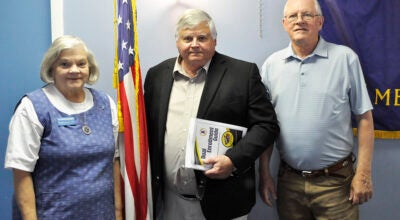Troy electric rate increase approved
Published 9:50 pm Tuesday, September 23, 2008
It’s official — City of Troy electric customers will be paying about 14 percent more for power under a new rate plan approved by the city council Tuesday.
The ordinance, passed unanimously by the council, raises the rate for residential customers to 7.8 cents per kilowatt hour from 6.8 cents. The increase also affects commercial and industrial customers.
City officials said the rate hike is needed to offset an increase in the city’s wholesale cost from Alabama Power and higher operating expenses for the electric system.
“It’s very difficult for us to have to consider a rate increase, but we really don’t have any choice,” said city council president Johnny Witherington.
The City of Troy owns its electric system and buys power from Alabama Power. The city’s current contract started in 2005 and called for an increase in the city’s wholesale cost this year.
The rates are now expected to remain unchanged until the contract expires in 2010.
The city council also passed an ordinance reappointing Mayor Jimmy Lunsford as superintendent of the utilities department.
The city council adjourned until Friday at 1 p.m. when council members will reconvene to vote on the city’s 2009 budget.
Lunsford told the council he expects the total budget to be more than $40 million and includes a 2.5 percent cost of living raise for city employees and a surplus of about $400,000.
In a work session prior to the regular meeting, Lunsford met with the council to discuss the budget “guesswork” — projecting growth in city revenue streams.
“Most of the other things we deal with — salaries, fuel for vehicles — we have pretty good idea of what expenses are going,” Lunsford said.
Revenue is tougher to predict, Lunsford said, and the council supported projecting small growth in sales tax, ad valorem tax and utility department revenue.
This year, city sales tax has brought in about $5.9 million compared to $5.6 million the year before — about a 2 percent increase. The city is projecting similar growth in 2009, as well as slight increases in ad valorem taxes and utility revenues.
Lunsford said utility revenue is hard to project because it is unclear how much potential revenue will be lost to unpaid bills.
Lunsford may propose an increase in the deposit required to turn on power to offset lost revenue from unpaid bills.
“There should be enough in the deposit to cover the average monthly bill,” he said.





